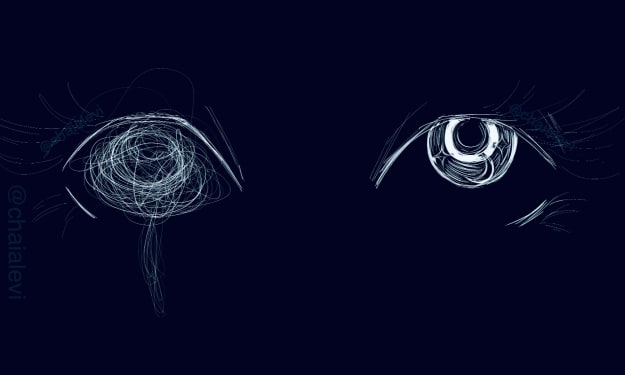Life after an eating disorder
the never-ending process

It’s always been about control. The complexities of triggers, motives, and behaviors are not set aside or ignored when it is said that an eating disorder is about control. You want control over how you are perceived, treated, regarded, spoken of. We know the overwhelming end results of fitting the ideal forced down our throats and inflected on our bodies. We know the devastation we are met with when we accept ourselves at our current or our best — we can be the healthiest we can physically manage and it is treated as lessor or a moral failing. Our bodies are not our own and that is the tragic lie we are indoctrinated and poisoned with.
There is no true end to an eating disorder. It can be immobilized and locked away, but remains a permanent guest that will not leave so the best you can do is remove its claws and fangs and pray that it remains in its cage incapacitated. You life is split into parts: before activation, during activation, and post-activation. The goal is to keep at or return to post-activation because there is no undoing. You got the paper water and now that it’s dry it’s still fine but it no longer will be as it was before. Sometimes it gets droplets, sometimes it gets caught in the storm, but with time and care it will go back to being dry and intact.
The drivers of that control vary. The drivers for different eating disorders vary. The personal motives of myself or another could line up or not at all.
In anorexia: I am driven by body dysmorphia, from the distress of not seeing a change in my shape and size in the mirror since the age of 13. 117 or 161 - the weight doesn’t matter because the image I see before me stays the same. I cannot see it and at times it can distort on me. I am driven by a need to take control of my body because none of the rest of it responds as it should and at least my weight I would keep consistent. I am driven by self-destruction because I still don’t always know how to cope with my emotions and emotional response so at least I can be in control of this one thing. I am driven by feeling useless and helpless because I can’t cure or fix people or change their situation but I can be in control of the number on the scale. I cannot deal with even more bad news and bad things and bad people, so at least I can be in control of how people speak of my body because they will speak and if you give them little to complain about then you know what they will say. My motives are purely selfish and self-centered and self-involved. My opinion of myself doesn’t extend to others because why would I bother? I am the one in pain and poorly coping so I am only looking out for myself.
In orthorexia: I am driven by paranoia, in what my food can do or not do to me. Is this application of treatment for the plant going to slowly poison me over time? Will something build up or will that something break something else down in me? Is it safe to eat this fruit or that root? Maybe eating the right foods will lead to some internal purity and make everything run better. Determining the right foods was a trick and a half — a cheap party trick dressed up in niceties and subtle undercurrent of judgement and fear. I am driven by the need to control. Maybe in controlling what I ingest will stop the aches in my joints, stop the stomach problems, stop the muscles from tiring — stop the pain I can’t get rid of from a genetic disorder. Maybe I can dictate my path from the inside.
In bulimia: I am driven to undo the mentally ill slights and wrongs I have committed against myself. In eating “too much” or the “wrong” foods, it can be rid of by exercising even when I have eaten too little to
It always comes back to control.
Body dysmorphia is not an eating disorder and has nothing do with fatness. It is a fixation of a distortion on a body part or overall body image. Some features I do fixate on, but it is my body that takes the most emotional and mental toll. Occasionally moments of clarity come through for me. Those moments don’t last and I can’t feel I can trust them because the body I had at 13 is what remains when I view myself day in and day out. By keeping myself small and underweight, I was able to keep a consistent shorts size and a bra size that was available from any brand. I can’t picture still how I look to others and I have learned to accept that I can’t picture myself. I am a vague figure without detail. I learned the hard way that there is no way to starve myself into a size that will allow me to myself as I am.
To add confusion to the fire, there is the question of why is it that I shouldn’t be fat but other fat people are beautiful as they are? We are taught that being fat is to be worthless. I do not find fat people worthless. A part of me feels that I am worthless. Is the idea of myself being fat a worrisome idea for me because then it be a symbolic yet physical manifestation of that being true? Being fat is seen as a result of laziness, lacking control, and self-loathing. Either way, we are expected to be miserable but one of those miseries is rewarded. We are also taught that to be disabled is to be worthless. You are a drain, a leech, a waste of space. No matter if you are skinny or fat, you are taking up space that you don’t deserve because you are with clearly defined limits and people do not like being said no to. If you don’t fit what is expected, you are worth nothing and don’t deserve anything good or decent. And if you cannot escaped being disabled, a part of you will want to escape being fat because that is the only part that you can any chance of having any control over. Being skinny is one of your few chances of being treated as a human.
And you can understand all of this. You can embrace fat people and understand that weight doesn’t dictate beauty as you were taught. But you will still feel punish yourself because you don’t remember how to love yourself without conditions.
So now here you are, stuck with these thoughts and feelings and fears and worries. You feel useless and helpless but you can’t go back to your old habits because it almost landed you in the hospital. I ended up stopping my disordered eating habits because I could barely walk across my own apartment and I realized I would end up needing to be hospitalized. I realized I didn’t want to break my mother’s heart by having to explain to her that her child had to be hooked up to an IV because she restricted food too much for too long. I couldn’t get professional help because I didn’t “look” sick enough. I couldn’t get help because I was a bad anorexic and that only made me want to try harder at being a better anorexic. The system failed me. I couldn’t fail my mother.
There is so much more to this, but crucial parts and lesser details aren’t mine yet to share. Eventually, but not now.
I write about the eating disorders in present tense because while I don’t engage in these behaviors any longer, the thoughts persist. The thoughts are rarely quiet or absent. The bulimic thoughts are rarely ever present, the orthorexic thoughts come to mind every week or so, but the anorexic thoughts still show up every few days. I don’t act on them but they tire me out. The more things are out of my control, the louder, more frequent, and persistent these thoughts are. I don’t think they will ever go away. So I have accepted my role as cruel warden to beat these thoughts away as I check and recheck the locks on the cages they are kept in. The locks may be rusting and need to be replaced, but I will find the replacements and keep these disorders out of the way until I find a way to starve them just as they have starved me.
—
If you are struggling, I don’t know what else to say except to try to get help. It won’t be easy to accept help and it likely won’t be a smooth process getting the help. There is a discrepancy in care between men and women. Seeking help for an eating disorder as a man will be more difficult because there are fewer resources because, unfortunately, these disorders are regarded as a “girl’s” disorder. But it is possible to figure out what to do. Do not seek out online support groups because they are largely nonexistent. You may end up being alone in this. However, it is worth it to not feel so awful anymore and to know that you are not causing further permanent damage. The damage that different eating disorders have on your body are well documented. Look up academic papers - it helps when entering into the search bar to add .pdf and a respected university’s name. Look up articles on Mayo Clinic and NIMH. Do this while looking for professional guidance so that you may start recovering sooner than later. You don’t need to and shouldn’t be punishing yourself like this for no true or reasonable reason — there is no true or reasonable reason. You can do this.
About the Creator
Chaia Levi
like if Nabokov had a brain injury
artist, writer, photographer
instagram, tiktok, tumblr: @chaialevi






Comments
There are no comments for this story
Be the first to respond and start the conversation.